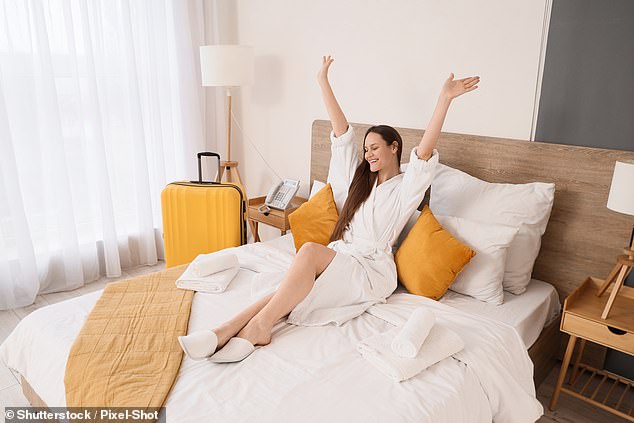A safety expert has issued a warning to guests staying in hotels, guesthouses and B&Bs to watch out for five spots in rooms that contain the most dirt.
As millions of Brits plan to stay in hotels this spring, experts caution that even the cleanest-looking rooms may harbor germs.
In fact, surfaces in the average average hotel room are found to be dirtier than a typical home, an airplane, and even a school – while hotel showerheads contain 25,000 times the bacteria of a toilet seat.
Surprisingly, higher-star hotels can have even more germs on common surfaces.
To help travellers enjoy a relaxing – and bacteria-free – stay, safety experts at Locksmith Dartford have revealed the five dirtiest spots in a hotel room that you’ll want to keep an eye out for.
Bedspreads, pillows and furnishings
Bedspreads, decorative pillows, and throws are some of the dirtiest surfaces in hotel rooms.
Unlike sheets, which are washed between guest stays, these items often go unwashed for weeks – or even months – leading to a buildup of dead skin cells, saliva, bodily fluids, and other germs.

Bedspreads, decorative pillows, and throws are some of the dirtiest surfaces in hotel rooms
These items are rarely cleaned by housekeeping as they are not in direct contact with guests, making them a hidden germ hotspot.
Experts recommend removing them from your bed upon arrival and using a disinfectant spray on fabric surfaces.
For extra protection, bring a travel-size pillowcase to cover any potentially contaminated pillows.
According to Locksmith Dartford, ex-hotel cleaner shared on Reddit: ‘Most hotels do not wash the big duvet, they only wash the sheets. At one hotel I worked at, they would only wash the duvet that was white if it had an actually dirty-looking spot on it.’
Another revealed: ‘Maids and housekeeping are typically paid very little and expected to clean an unbelievable amount of rooms in a day.
‘What this means is that they become experts in shortcuts and making a room look clean without actually cleaning it.’
Telephone handsets and TV remote
Hotel room phones and TV remotes are high-touch surfaces that frequently harbour harmful bacteria, including cold and flu viruses, E. coli, and even traces of faecal matter.
One study found that remotes in three-star hotels contained Bacillus spp., bacteria linked to respiratory and gastrointestinal infections, and four and five-star hotels showed even higher levels of harmful bacteria.

Hotel room phones and TV remotes are high-touch surfaces that frequently harbour harmful bacteria, including cold and flu viruses, E. coli, and even traces of faecal matter
These items are often wiped quickly with a cloth that might just spread germs around.
To stay safe, use an antibacterial wipe on these surfaces before touching them, or consider sealing the remote in a plastic sandwich bag to avoid direct contact with germs.
Bathroom
Hotel bathrooms often appear clean but can be far more contaminated than they look.
Showerheads, shower curtains, bathtubs, and even sinks can harbor dangerous bacteria like Legionella, which can cause Legionnaires’ disease.
One study found that a hotel showerhead had 25,000 times the bacteria of a toilet seat.
Unfortunately, some housekeeping staff use the same cloth to clean the toilet, sink, and countertops, increasing the risk of cross-contamination.
To reduce exposure, wipe down bathroom surfaces with disinfectant wipes before use, run hot water for a minute to flush bacteria from the showerhead, and consider giving the bathtub a quick scrub with shampoo or shower gel before soaking.

Showerheads, shower curtains, bathtubs, and even sinks can harbor dangerous bacteria like Legionella, which can cause Legionnaires’ disease
Ice bucket
While an ice bucket may seem like a harmless convenience, it can be a breeding ground for bacteria.
Many guests have used ice buckets for less than appetising purposes, like makeshift vomit containers, and they are often just rinsed between uses without proper cleaning – making them a potential hotspot for germs.
Experts recommend always using a plastic liner in the ice bucket or asking housekeeping to provide one.
Alternatively, it’s safer to opt for pre-packaged ice from the hotel bar or a nearby store, ensuring that your ice is fresh and bacteria-free.

Leftover coffee oils and the damp, warm environment inside the machine create the perfect breeding ground for germs, mould, and yeast
Coffee makers and glassware
Leftover coffee oils and the damp, warm environment inside coffee machines create the perfect breeding ground for germs, mould, and yeast.
If the machine isn’t regularly cleaned, your morning coffee could come with an unwanted dose of bacteria.
Similarly, hotel glassware can be risky, as housekeepers may simply rinse glasses in the bathroom sink instead of properly sanitising them, which could leave germs from the previous guest behind.
To stay safe, consider bringing your own travel mug, or ask for freshly sanitised glasses from the hotel staff.
If you’re using the coffee maker, wipe it down before use, or opt for coffee from a trusted source like the hotel bar.
This article was originally published by a www.dailymail.co.uk . Read the Original article here. .

